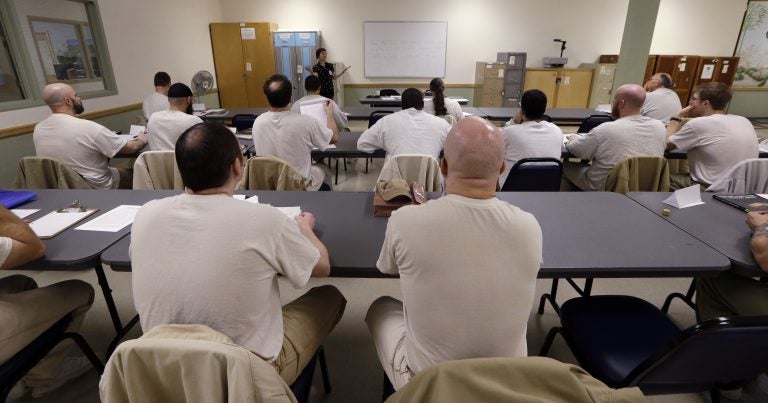Report: College aid for prisoners pays dividends for all down the line
Advocates say the study shows that federal law keeping Pell Grants from the incarcerated should be overturned.

In this photo taken Thursday, Jan. 28, 2016, inmates look on in their college world history class at the Monroe Correctional Complex in Monroe, Wash. College education in American prisons is starting to grow again, more than two decades since federal government dollars were prohibited from being used for college programs behind bars. (Elaine Thompson/AP Photo)
Allowing prisoners to receive federal aid to pay for college courses while incarcerated would reduce recidivism rates, save states money and boost the economy as former inmates get higher-paying jobs, a new report shows.
Entitled Investing in Futures, the report from the Vera Institute of Justice estimates that nearly 463,000 inmates in state prisons — including 7,239, or more than a third of the prison population, in New Jersey — would benefit if the federal government rescinds a 1994 law that prevents people from receiving Pell Grants while incarcerated. Pell Grants are the main federal college aid that does not need to be repaid for low-income students. Even if only half of those eligible in New Jersey were to take college classes, that would lead to a 5 percent increase in the number of former prisoners employed each year and a $650,000 rise in wages earned the year after their release, according to the report.
“This would benefit not just the incarcerated people themselves, but also the communities they will be returning to,” said Nick Turner, president of the Vera Institute, a New York-based organization advocating for criminal justice reforms.
The institute’s push to make it easier for those in prison to get an education dovetails with an effort by New Jersey lawmakers to extend eligibility for state financial aid to inmates here. The Senate last year passed S-2055, which would eliminate a provision in current state law that prohibits prisoners from receiving either state grants or scholarships, most notably Tuition Assistance Grants for those of low income. The bill awaits action by the Assembly Higher Education Committee.
College courses are offered in seven of New Jersey’s nine correctional facilities through the New Jersey Scholarship and Transformative Education in Prisons Consortium, or NJ-STEP. Working with the state Department of Corrections and Parole Board, a group of colleges offers a host of classes, including Cumberland Community College, Drew University, Essex County College, Mercer County Community College, Princeton University, Raritan Valley Community College, Salem Community College and The College of New Jersey. The consortium is housed at Rutgers University in Newark.
Advocates: Now is the right time for reform
NJ-STEP, which enrolled about 550 students last July, is funded largely by nonprofit foundations. Some students currently get federal aid in the form of Second Chance Pell Grants, a pilot program the Obama administration began in 2016 offering grants for about 12,000 inmates nationwide.
Turner said now is the perfect time to push for an end to the ban on Pell Grants, given the bipartisan support for criminal-justice reform that led to the enactment last month of the FIRST STEP Act. That law, co-sponsored by U.S. Sen. Cory Booker, (D-NJ), shortens mandatory minimum sentences for nonviolent drug offenses, gives judges more discretion in imposing sentences for those crimes and makes several other changes to improve prison conditions, all at the federal level.
“This is an opportunity to leverage the near unanimous consensus that the criminal justice system simply is not working as it should,” Turner said.
Harsh sentencing and the ban on Pell Grants for those incarcerated dates back to the 1980s and 1990s and anti-drug and tough-on-crime mentalities that prevailed then.
These helped fuel a trend that reform advocates call “mass incarceration,” which disproportionately impacted African-Americans. The United States has the highest per capita incarceration rate in the world, according to the World Prison Brief database. Margaret diZerega, project director at the Vera Institute, said that restoring access to Pell Grants and a college education for prisoners would reduce both recidivism rates and violence in prisons, raise employment prospects for former inmates, and “has the potential to disrupt mass incarceration.” It would also save about $366 million nationally by reducing prison costs, with the annual savings in New Jersey estimated at $10.2 million if just half of eligible prisoners take courses.
Unlocking the ‘transformative’ power of education
Arthur Rizer, Justice and Civil Liberties Policy Director at the R Street Institute, said when inmates are taking classes, they are busy and less apt to cause trouble for fellow prisoners and guards. But they also feel better about themselves.
“An education is transformative, which is why we send our kids to college,” said Rizer, a former police officer and prosecutor who now works at the conservative think tank. “For the person who is incarcerated, it is even more transformative. They have no hope. But in the classroom, they see themselves as a person, rather than just another number being watched by the guards.”
Jose Bou, who earned a bachelor’s degree from Boston University while serving a 12-year prison sentence for drug trafficking, attested to that.
“Something happened as I started to get educated,” said Bou, who is now equity, family and community partnerships manager at the Holyoke Public Schools in Massachusetts. “I wanted to be part of something bigger.”
The Vera Institute’s report is not the first to show the benefits of education to prisoners.
A 2014 RAND Corporation study found that those who took classes while in prison had lower rates of reincarceration and higher rates of post-release employment than prisoners who did not take classes. It also found that the cost of reincarceration far outweighed the cost of providing an education to those behind bars.
“This is a common sense investment where everybody wins,” diZerega said.
WHYY is your source for fact-based, in-depth journalism and information. As a nonprofit organization, we rely on financial support from readers like you. Please give today.



